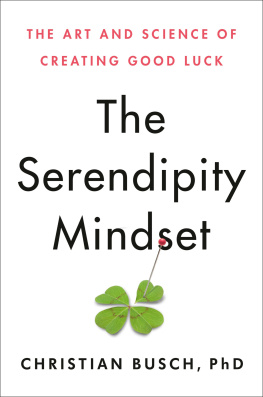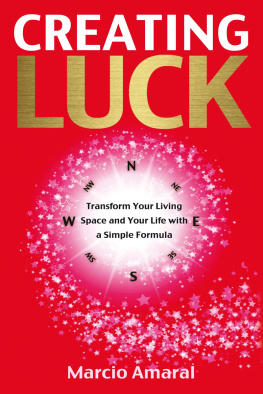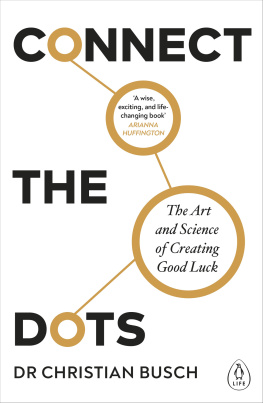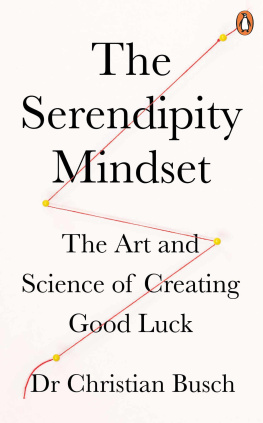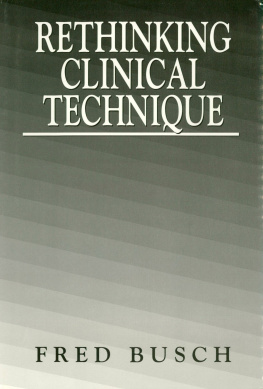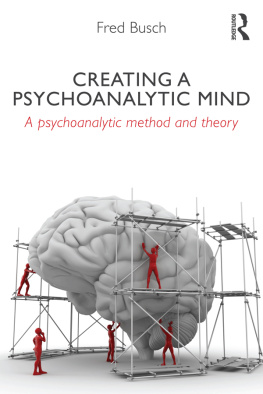Christian Busch - The Art and Science of Creating Good Luck
Here you can read online Christian Busch - The Art and Science of Creating Good Luck full text of the book (entire story) in english for free. Download pdf and epub, get meaning, cover and reviews about this ebook. year: 2020, publisher: Penguin Publishing Group, genre: Religion. Description of the work, (preface) as well as reviews are available. Best literature library LitArk.com created for fans of good reading and offers a wide selection of genres:
Romance novel
Science fiction
Adventure
Detective
Science
History
Home and family
Prose
Art
Politics
Computer
Non-fiction
Religion
Business
Children
Humor
Choose a favorite category and find really read worthwhile books. Enjoy immersion in the world of imagination, feel the emotions of the characters or learn something new for yourself, make an fascinating discovery.
- Book:The Art and Science of Creating Good Luck
- Author:
- Publisher:Penguin Publishing Group
- Genre:
- Year:2020
- Rating:3 / 5
- Favourites:Add to favourites
- Your mark:
- 60
- 1
- 2
- 3
- 4
- 5
The Art and Science of Creating Good Luck: summary, description and annotation
We offer to read an annotation, description, summary or preface (depends on what the author of the book "The Art and Science of Creating Good Luck" wrote himself). If you haven't found the necessary information about the book — write in the comments, we will try to find it.
The Art and Science of Creating Good Luck — read online for free the complete book (whole text) full work
Below is the text of the book, divided by pages. System saving the place of the last page read, allows you to conveniently read the book "The Art and Science of Creating Good Luck" online for free, without having to search again every time where you left off. Put a bookmark, and you can go to the page where you finished reading at any time.
Font size:
Interval:
Bookmark:
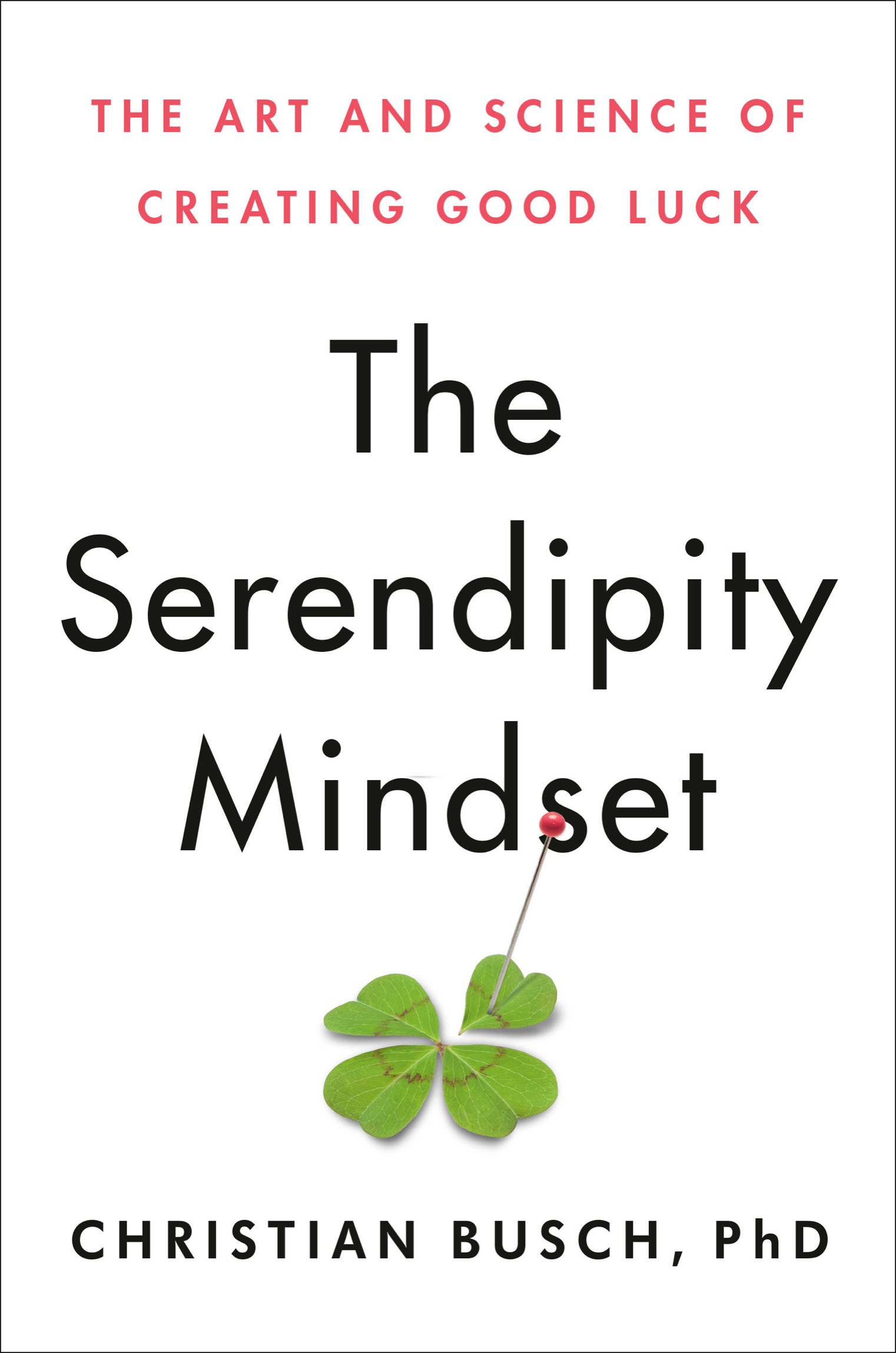
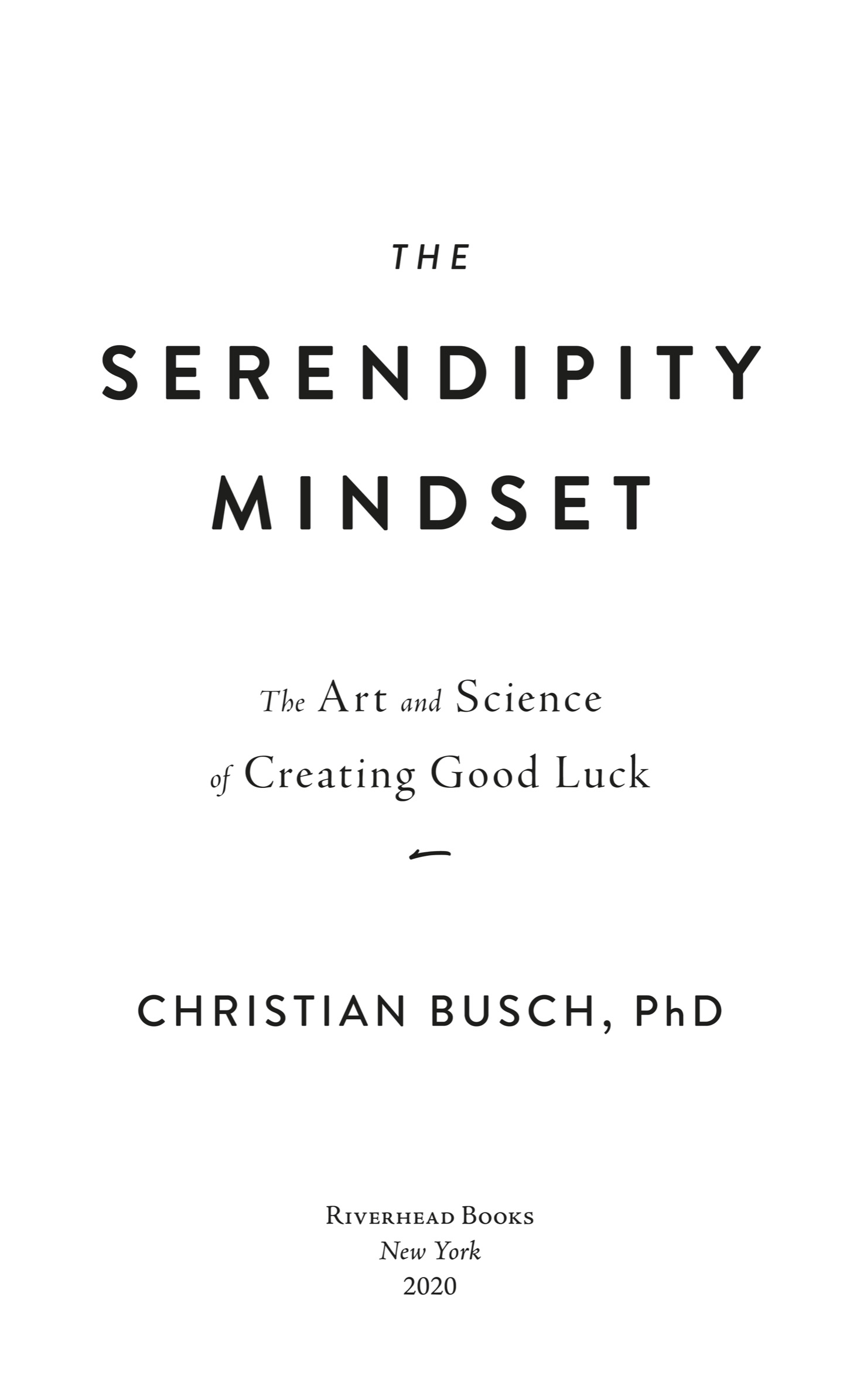

RIVERHEAD BOOKS
An imprint of Penguin Random House LLC
penguinrandomhouse.com

Copyright 2020 by Christian Busch
Penguin supports copyright. Copyright fuels creativity, encourages diverse voices, promotes free speech, and creates a vibrant culture. Thank you for buying an authorized edition of this book and for complying with copyright laws by not reproducing, scanning, or distributing any part of it in any form without permission. You are supporting writers and allowing Penguin to continue to publish books for every reader.
Images courtesy of Penguin Random House Ltd.
Image on courtesy of Leith Sharp.
Riverhead and the R colophon are registered trademarks of Penguin Random House LLC
Library of Congress Cataloging-in-Publication Data
Names: Busch, Christian (Professor of business), author.
Title: The serendipity mindset: the art and science of creating good luck / Christian Busch, PhD.
Description: New York: Riverhead Books, 2020. | Includes bibliographical references and index.
Identifiers: LCCN 2020008801 (print) | LCCN 2020008802 (ebook) | ISBN 9780593086025 (hardcover) | ISBN 9780593086049 (ebook)
Subjects: LCSH: Serendipity. | Success. | Success in business. | Fortune.
Classification: LCC BF637.S8 B795 2020 (print) | LCC BF637.S8 (ebook) | DDC 158.1dc23
LC record available at https://lccn.loc.gov/2020008801
LC ebook record available at https://lccn.loc.gov/2020008802
While the author has made every effort to provide accurate telephone numbers, Internet addresses and other contact information at the time of publication, neither the publisher nor the author assumes any responsibility for errors, or for changes that occur after publication. Further, publisher does not have any control over and does not assume any responsibility for author or third-party websites or their content.
pid_prh_5.5.0_c0_r0
For my dear parents, Ulla and Rainer, whose love, kindness, and resilient optimism have been an inspiration to me throughout my life.
Im always surprised when I see people who have been successful... and theyre absolutely convinced that its all because they were so smart. And Im always saying, well, I worked hard, and Ive got some talent, but there are a lot of hardworking, talented people out there.... There was this element of chance to it... of serendipity... [and] you want to see if you can maybe figure out how to sprinkle that stardust on other people.
B ARACK O BAMA , 44 TH PRESIDENT OF TH E U NITED S TATES OF A MERICA
We all like to feel like we are masters of our own destinyto feel in control of our future, to know how we will reach our goals and ambitions. In short, we all like to have a plan.
This seemingly innate human desire to map out our future is reflected in almost every aspect of modern life. Organizations, governments, and every one of us all structure our activities around plans, strategies, and targets that we make. We construct routines, rules, and processesfrom setting the alarm clock to organizing national electionsto ensure that those plans come to fruition.
But are we really in control of our lives? Or is this just an illusion? Despite all of our planning, modeling, and strategizing, there appears to be another factor at work: the unexpected.
We all recognize that unforeseen events, chance meetings, or seeming coincidences are often not just minor distractions or specks of grit in the machines of our well-oiled lives. The unexpected is often the force that makes the greatest difference to our lives and our futures. It is the critical factor.
Perhaps you found your spouse by coincidence? Or came across your new job or apartment by accident? Did you meet your future cofounder or investor by chance? Or did you randomly pick up a magazine just to find exactly what you needed to know to solve a problem?
How did such moments, big or small, change your life? How could your life have played out had everything just gone according to plan?
Wars are won or lost, companies thrive or collapse, and love is found or lost all on the turn of the unexpected. Whatever our ambitions are in lifefinding business success, love, joy, or spiritual meaningwe are prone to coincidental encounters. The most mundane moment, like running into someone in the gym, can change your life.
Even in the rigorous world of scientific research, the power of the unexpected is (almost) always at play. Studies suggest that around 30 to 50 percent of major scientific breakthroughs emerge as the result of accidents or coincidences. One chemical spills into another, cells combine in dirty petri dishes, or there is a chance encounter between experts whose incidental conversation sparks new insights. The greatest opportunities, for individuals and organizations alike, are often a matter of serendipity.
So does most success boil down to blind luck, to success or failure brought simply by chance rather than through our own actions? No; intuitively we sense that this isnt true either. While we recognize that the greatest turning points and transformative opportunities in our lives often seem to occur by chance, some people just seem to have more luck, and subsequently more success and joy, than others.
This isnt just a modern phenomenon, either: The chemist and biologist Louis Pasteur thought that chance favors the prepared mind. The military leader and emperor Napolon Bonaparte said he would rather have lucky generals than good ones. And the Roman writer and statesman Seneca argued that luck is a matter of preparation meeting opportunity.
Their beliefs all reflect the idea that while chance is a real force in our lives and in the world, there is more to life than blind luck. Indeed, the word fortune can refer to both success and luck. Even commonplace phrases such as You make your own luck or Hes a man with an eye for the main chance all point to the idea that success in life depends on an interactiona synthesisbetween pure chance and human effort.
What is really going on here? Are some people able to create the conditions for positive coincidences to happen more often than others? Are they better able to spot and grasp these moments and turn them into positive outcomes? Can our education and approach to work and life equip us with the most important skill of allthe ability to navigate the unexpected and make our own smart luck?
This is a book about the interactions of coincidence, human ambition, and imagination. It is a book about serendipitythis unexpected good luck resulting from unplanned moments in which proactive decisions lead to positive outcomes. Serendipity is the hidden force in the world, and it is present all around us, from the smallest day-to-day events, to life-changing, and sometimes world-changing, breakthroughs.
However, only few of usincluding many of the people you will meet in this bookhave deciphered this code and developed the mindset needed to turn the unexpected into a success and a force for good.
Once we realize that serendipity is not just about a coincidence that happens
Font size:
Interval:
Bookmark:
Similar books «The Art and Science of Creating Good Luck»
Look at similar books to The Art and Science of Creating Good Luck. We have selected literature similar in name and meaning in the hope of providing readers with more options to find new, interesting, not yet read works.
Discussion, reviews of the book The Art and Science of Creating Good Luck and just readers' own opinions. Leave your comments, write what you think about the work, its meaning or the main characters. Specify what exactly you liked and what you didn't like, and why you think so.

